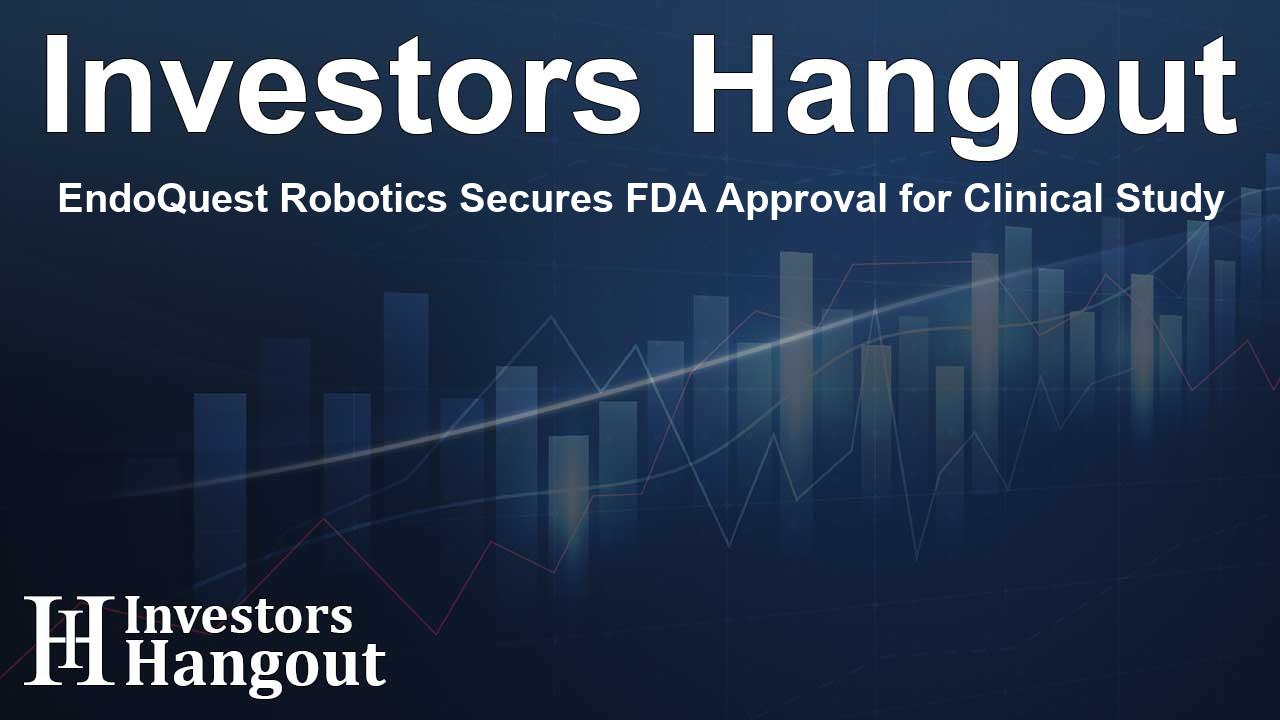EndoQuest Robotics Secures FDA Approval for Clinical Study

EndoQuest Robotics Achieves Milestone with FDA Approval
EndoQuest Robotics, Inc. has achieved a significant milestone by receiving an Investigational Device Exemption (IDE) from the US Food and Drug Administration (FDA). This approval pertains to their key colorectal clinical study, aimed at evaluating their advanced endoluminal surgical technologies. The IDE has set the stage for an important study known as the Prospective Assessment of a Robotic-Assisted Device in Gastrointestinal Medicine (PARADIGM).
About the Colorectal Clinical Study
This exciting multi-center, open-label, prospective study will assess the safety and effectiveness of EndoQuest’s Endoluminal Surgical (ELS) System. The primary focus is on robotic endoscopic submucosal dissection (ESD) procedures to remove colorectal lesions. The study will involve fifty participants across five prominent US healthcare institutions, showcasing the collaboration between leading medical facilities.
Leading Healthcare Institutions Involved
The study will be conducted at prestigious institutions, including Brigham and Women’s Hospital in Boston, Mayo Clinic in Scottsdale, Cleveland Clinic, AdventHealth in Orlando, and HCA Healthcare in Houston. Each institution is recognized for its exceptional healthcare services and commitment to advancing patient care.
EndoQuest's Vision for Minimally Invasive Surgery
Upon receiving the FDA's approval, Eduardo Fonseca, the interim CEO of EndoQuest Robotics, expressed enthusiasm about how this advancement aligns with the company's mission. He emphasized that their flexible robotic system possesses the potential to significantly enhance colorectal surgical outcomes, enabling physicians to perform less invasive and scar-free procedures.
Comments from Leadership
Dr. Todd Wilson, the chief medical officer and chairman of the scientific advisory board, also shared his excitement, characterizing the IDE approval as a landmark event. He noted that the evolution to perform endoluminal surgery could reshape the standard for minimally invasive colorectal procedures, potentially allowing many patients to avoid more invasive surgeries like colectomies.
Technological Advancements with the ELS System
The ELS System has been thoughtfully developed to address the technical challenges typically faced with complex endoluminal procedures. By enhancing visualization and precision, this innovative system allows for surgical tasks that were not feasible with previous techniques. Preliminary studies have shown that the ELS System outperforms conventional methodologies, offering shorter procedure times and a reduced learning curve for medical professionals.
Impressive Outcomes from Preliminary Studies
A pre-clinical ESD study conducted and presented at a recent medical conference demonstrated that the ELS system surpassed previous techniques, suggesting significant procedural benefits. This progress attests to EndoQuest Robotics' commitment to redefining how surgeons approach colorectal surgeries.
About EndoQuest Robotics
EndoQuest Robotics is a trailblazer in developing transformative endoluminal robotic technologies. The company is dedicated to improving gastrointestinal (GI) medicine and endoluminal surgical procedures by providing physicians with innovative tools that promote precision and flexibility in surgical access. Their groundbreaking technologies allow for procedures through the body’s natural orifices, marking a new era in minimally invasive surgery.
Collaboration for Future Innovations
Since its inception, EndoQuest Robotics has worked closely with healthcare providers, researchers, and industry leaders to advance its revolutionary robotic systems. The ongoing goal remains to enhance patient outcomes and set new standards in surgical practices. The company continuously engages in research and development to ensure their technologies remain at the cutting edge of medical innovation.
Frequently Asked Questions
What is the Investigational Device Exemption (IDE)?
The Investigational Device Exemption (IDE) allows clinical studies to be conducted using devices that have not yet been cleared by the FDA, facilitating the evaluation of their safety and effectiveness.
What is the primary focus of the PARADIGM study?
The PARADIGM study aims to evaluate the safety and performance of the Endoluminal Surgical (ELS) System in robotic endoscopic submucosal dissection (ESD) procedures for removing colorectal lesions.
How many institutions are participating in the study?
Five top healthcare institutions across the US are participating in the study, contributing their expertise to support the evaluation of the ELS System.
What technological advancements does the ELS System offer?
The ELS System is designed to improve visualization and precision in endoluminal procedures while reducing the learning curve for physicians, thus enhancing overall surgical outcomes.
How does EndoQuest Robotics aim to change surgical practices?
EndoQuest Robotics is focused on advancing minimally invasive surgery by developing technologies that allow for scar-free procedures, ultimately improving patient recovery and outcomes.
About The Author
Contact Riley Hayes privately here. Or send an email with ATTN: Riley Hayes as the subject to contact@investorshangout.com.
About Investors Hangout
Investors Hangout is a leading online stock forum for financial discussion and learning, offering a wide range of free tools and resources. It draws in traders of all levels, who exchange market knowledge, investigate trading tactics, and keep an eye on industry developments in real time. Featuring financial articles, stock message boards, quotes, charts, company profiles, and live news updates. Through cooperative learning and a wealth of informational resources, it helps users from novices creating their first portfolios to experts honing their techniques. Join Investors Hangout today: https://investorshangout.com/
The content of this article is based on factual, publicly available information and does not represent legal, financial, or investment advice. Investors Hangout does not offer financial advice, and the author is not a licensed financial advisor. Consult a qualified advisor before making any financial or investment decisions based on this article. This article should not be considered advice to purchase, sell, or hold any securities or other investments. If any of the material provided here is inaccurate, please contact us for corrections.
